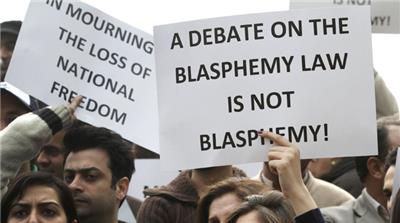http://www.aljazeera.com/indepth/features/2014/05/living-fear-under-pakistan-blasphemy-law-20145179369144891.html
by Haris Raja
“He ruined his own face when the lunatic tried to spit on the moon.” This couplet from the poetry of Mirza Tahir Ahmad, one of the great scholars of Islam in the 20th century, is an apt response to someone trying to blaspheme the honor of the prophet of Islam, Muhammad, may peace and blessings be upon him. Muslims consider Prophet Muhammad to be the best among mankind. Insults to the Prophet can neither demean his actual status nor diminish his love in the hearts of more than a billion Muslims around the world. The issue of how to react to these insults, however, is something that needs to be addressed.
A recent article published in the Washington Post calls out the infamous blasphemy laws of Pakistan that have ruined many lives and have incited violence in the name of protecting the honor of the Prophet of Islam. Case in point is a Christian man who is on the run after being accused of blasphemy by a Muslim friend for sending a blasphemous poem on WhatsApp. These blasphemy laws seem untouchable and deemed so sacred that even a cursory effort of calling them into question can be a death warrant, even if its the governor of the largest province in Pakistan. The brutal murder of Gov. Salman Taseer by his own gunman is still fresh in the memory of Pakistanis. Taseer was not the only one. Just recently a high profile singer from the Sufi tradition, Amjad Sabri, was murdered for merely singing something that was deemed blasphemous. A few years ago Shahbaz Bhatti, a Roman Catholic and an elected member of the Pakistan National Assembly, was murdered for speaking out about the blasphemy laws. These are just a few high profile examples. The list of average citizens including members of the Ahmadiyya Muslim Community (a minority sect in Islam), Christians and Hindus that are incarcerated or tried under these laws goes on and on. Many cases are based on personal or tribal feuds where the accuser simply alleges an act of blasphemy on the defendant to take revenge.
Every Muslim knows the status of Prophet Muhammad in Islam. Religiously speaking Muslims consider him to be the pinnacle of humanity and the most beloved of God. The Holy Quran speaks about his spiritual status in these words, “Then he (Muhammad) drew nearer to God… So that he became, as it were, one chord to two bows or closer still” (53:9-10).
Love for the Holy Prophet of Islam is a hallmark of a Muslim. However, this love ought to be coupled with obedience. As the Holy Quran states, O Prophet “say, if you love God, follow me: then will God love you” (3:32). It is clear from this verse that finding true love of God requires obedience of the Prophet. An individual’s love for the Prophet can certainly arouse the emotions and even anger when the Prophet is ridiculed, however one must keep the practice (sunnah) of the Holy Prophet in mind before taking any harsh or hateful action. At the time of the Prophet, Abdullah bin Abi Sulul would openly ridicule the Prophet. On one occasion Abdullah’s son asked the Prophet to kill his own father. The Prophet stopped him and didn’t approve of any harsh treatment. There is neither a single verse in the Holy Quran nor a single incident in the life of the Prophet that allows punishment for blasphemy. Obedience to the Holy Prophet, which dictates peaceful and dignified demeanor, must prevail over any harsh and hurtful reaction out of self-assumed love of the Prophet. Neither the Islamic state nor any individual is justified in taking an action against anyone, Muslim or Non Muslim, on the basis of blasphemy. The blasphemy laws in Pakistan are against the teachings of the Quran and the practice of the Prophet. These laws are being exploited to usurp the rights of religious minorities in Pakistan.
Prophet Muhammad’s honor does not need an endorsement from the people. In fact, he is called a “mercy for all of mankind” in the Quran. True love for the Prophet demands that Muslims also show mercy and compassion even towards those who ridicule him and don’t take things in their hands or make laws about punishing people for blasphemy.


